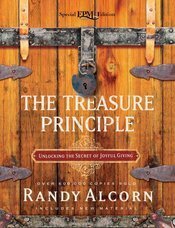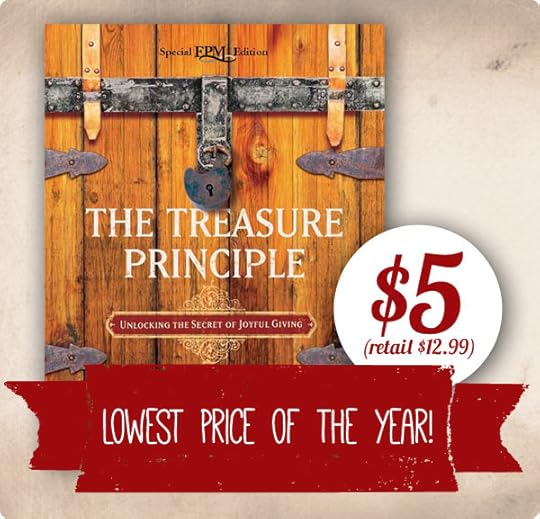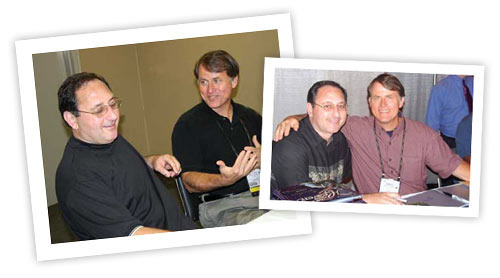Randy Alcorn's Blog, page 181
May 5, 2014
Oregon’s Natural Beauty Reflects Its Creator’s Magnificence
The heavens were made by the word of the Lord,
and all the stars, by the breath of His mouth.
He gathers the waters of the sea into a heap;
He puts the depths into storehouses.
Let the whole earth tremble before the Lord;
let all the inhabitants of the world stand in awe of Him.
For He spoke, and it came into being;
He commanded, and it came into existence. (Psalm 33:6-9, HCSB)
 I was born in Portland, Oregon and raised in Gresham, Oregon, where I live today. I think the rugged beauty of Oregon's coastline (where I've gone often on vacation, to speak and to write), and the rural green trees and hillsides that have always surrounded me have made me alert to the beauty of God's creation.
I was born in Portland, Oregon and raised in Gresham, Oregon, where I live today. I think the rugged beauty of Oregon's coastline (where I've gone often on vacation, to speak and to write), and the rural green trees and hillsides that have always surrounded me have made me alert to the beauty of God's creation.
The frequently gray skies and rain, in the winter, create a mood conducive to reflection and contemplation of life's meaning. I have meditated on Scripture and great books and have soaked them in while hearing the rain fall or the wind blow, or looking out at blue skies or stars. I've gone riding many times on the Springwater Corridor Trail, and breathed the fresh Oregon air, watching for deer, rabbits and beavers and thoroughly enjoying the Creator's art work.
This beautiful 4-minute time lapse video uses footage shot in Oregon:
The earth and everything in it,
the world and its inhabitants,
belong to the Lord;
for He laid its foundation on the seas
and established it on the rivers. (Psalm 24:1-2, HCSB)
I always think, if this kind of beauty remains in this fallen creation, what will God's resurrected world, the New Heavens and the New Earth, be like?! Since we know there’s going to be a New Earth and New Jerusalem, why not a New London, New Bejing, and a New Oregon? And a resurrected version of the places you love most, on a planet without pain (Revelation 21:4)?

Our Lord and God! You are worthy to receive glory, honor, and power. For you created all things, and by your will they were given existence and life. (Revelation 4:11, GNT)
Each blog regularly appears on my Facebook page where people often comment on it. If you’d like to comment or see others’ comments, we invite you to join us there.
May 2, 2014
Field Trip to a Junkyard
 How can we teach our children the emptiness of materialism in a direct and memorable way? Take them to a garage sale and show them how things that people spent great amounts of money on are now sold for pennies.
How can we teach our children the emptiness of materialism in a direct and memorable way? Take them to a garage sale and show them how things that people spent great amounts of money on are now sold for pennies.
Or, take them to visit a dump or junkyard. It can actually be a great family event. (The lines are shorter than at amusement parks, admission is free, and little boys love it.) Show them all the piles of “treasures” that were formerly Christmas and birthday presents. Point out things costing hundreds of dollars, that children quarreled about, friendships were lost over, honesty was sacrificed for, and marriages broke up over. Show them the remnants of battered dolls, rusted robots, and crashed cars. Let them look at the expensive furniture and electronic gadgets that now lie useless. Point out to them that nearly everything your family owns will one day end up in a junkyard like this.
Then read, or ask them to read, 2 Peter 3:10-14, which says when Christ returns the whole world “will be destroyed by fire” and “the earth and everything in it will be laid bare.” Ask them the ultimate question: “When all that you owned lies abandoned, broken, burned and useless, what will you have done that will last for eternity?”
What will survive the coming holocaust of things? The answer is, only God, His Word and people. Explain to your children how life should be invested in the eternal. Read to them Matthew 6:19-25, where Jesus says, “Lay up for yourselves treasures in heaven.” Tell them “you can’t take it with you,” but according to Jesus, you can send it on ahead!

Each blog regularly appears on my Facebook page where people often comment on it. If you’d like to comment or see others’ comments, we invite you to join us there.
photo credit: Julep67 via photopin cc / Corners modified from original
April 30, 2014
Overcoming Temptation by Looking Past It—and Looking Up
 Temptations always look good—otherwise they wouldn't be temptations. Resisting temptation is a gutsy, courageous, stubborn refusal to violate God's law. It’s recognizing and avoiding the devastating consequences when we choose sin. And it's repeatedly calling upon the indwelling Christ and Holy Spirit for the strength to say "no" to the world, the flesh, and the devil—to say "yes" to God instead. We do this in pursuit of the ultimate joy only found in knowing God.
Temptations always look good—otherwise they wouldn't be temptations. Resisting temptation is a gutsy, courageous, stubborn refusal to violate God's law. It’s recognizing and avoiding the devastating consequences when we choose sin. And it's repeatedly calling upon the indwelling Christ and Holy Spirit for the strength to say "no" to the world, the flesh, and the devil—to say "yes" to God instead. We do this in pursuit of the ultimate joy only found in knowing God.
When my thirst for joy is satisfied by Christ, sin becomes unattractive. I say no to the passing pleasures of immorality, not because I do not want pleasure, but because I want true pleasure, a greater and lasting pleasure that can only be found in Christ.
John Piper says,
The fire of lust’s pleasures must be fought with the fire of God’s pleasures. If we try to fight the fire of lust with prohibitions and threats alone—even the terrible warnings of Jesus—we will fail. We must fight it with a massive promise of superior happiness. We must swallow up the little flicker of lust’s pleasure in the conflagration of holy satisfaction.
Those who drink of immorality—or any kind of sin—are never satisfied (John 4:13). Those who drink of Jesus are fully satisfied (John 6:35). I can either have my thirst quenched in Jesus, or I can plunge deeper into sin in search of what’s not to be found there.
In this video from Desiring God, Ben Stuart offers advice for overcoming temptation: looking down stream to anticipate where the temptation leads, and looking upstream to God.
"No temptation has overtaken you that is not common to man. God is faithful, and he will not let you be tempted beyond your ability, but with the temptation he will also provide the way of escape, that you may be able to endure it" (1 Cor. 10:13).

Each blog regularly appears on my Facebook page where people often comment on it. If you’d like to comment or see others’ comments, we invite you to join us there.
photo credit: Stuck in Customs via photopin cc
April 28, 2014
The Treasure Principle and God’s Delightfully Surprising Ways
 The Treasure Principle is a book that has shocked me (surprise isn’t strong enough) in the response it has generated. It has sold nearly 2 million copies in English, been translated into 20 languages (including Chinese, Vietnamese, Indonesian and Arabic), and used of God to help launch the ministry of Generous Giving. It is often given away by churches to their entire congregations.
The Treasure Principle is a book that has shocked me (surprise isn’t strong enough) in the response it has generated. It has sold nearly 2 million copies in English, been translated into 20 languages (including Chinese, Vietnamese, Indonesian and Arabic), and used of God to help launch the ministry of Generous Giving. It is often given away by churches to their entire congregations.
The year it was released, Rick Warren asked me to speak on it at Saddleback Church where they gave away 14,000 copies in one day, which launched the book’s sales. Here’s my message I shared there in its entirety:
A story—I made a Treasure Principle related comment on a panel at a Generous Giving conference where they gave away the book, and a year later one man told me (after he’d already done it) he had decided to give away 37 million dollars to God’s kingdom.
I’d also like to share a couple of reader responses to the book EPM has received over the years:
I read The Treasure Principle and my wife and I committed to giving 20% of our income for kingdom work above and beyond our tithes by the end of 2011. Over the past year we have added giving to Ligonier Ministries, a widow who does not make ends meet in our neighborhood, and another missionary couple. God has been good to us, as I was out of work (except for some odd jobs, and my wife does not work) for 6 months last year. He had provided for all our needs, as my wife and I resolved in our hearts that we would not let His kingdom work suffer because we may. We paid our tithes first, our missionaries second, and our bills last. We never had a bill that went unpaid on time. — C. H., Pastor
God has used The Treasure Principle book and a mission trip to totally transform my life and vision. My husband and I have been giving out the book (we bought 48 of them at Christmas) to whoever the Lord lays on our heart. We are excited to be giving more and more financially to various ministries. What freedom it is to come to the understanding that we are stewards of His money, His time, His life in us. We lead a small group of young marrieds at church and this book will be featured in our next study. — M. R.
These are just a few of the hundreds of stories I’ve been told, and usually you only hear a fraction of them. God has used this book to impact lives and fund missions in ways that far outweigh anything I’ve done or will ever do—which brings tears to my eyes whenever I think of it.
God is kind and gracious. Sometimes what we do is way overblown in our thinking—and other times we do what seems a small thing (e.g. writing that book) and God takes it way beyond anything we could have imagined. He is faithful and sometimes delightfully surprising!

Each blog regularly appears on my Facebook page where people often comment on it. If you’d like to comment or see others’ comments, we invite you to join us there.
From Eternal Perspective Ministries
 Lowest price of the year on The Treasure Principle! EPM price $5 (retail $12.99) now until May 2, 11:59 p.m. PT. This exclusive EPM edition includes a special note to readers from Randy. To order see, www.epm.org/treasureprinciple.
Lowest price of the year on The Treasure Principle! EPM price $5 (retail $12.99) now until May 2, 11:59 p.m. PT. This exclusive EPM edition includes a special note to readers from Randy. To order see, www.epm.org/treasureprinciple.
Here are some ideas for passing on this message of generous, joyful giving:
Give the book to friends and family members.
Consider underwriting the cost of giving the book to your church body.
Lead a small group at your church based on The Treasure Principle. (Study materials are also available.)
Ask your pastor to consider sharing on the topic. (EPM offers free resources for pastors, including a pastors’ kit.)
Share your own story of generous giving with EPM. (Send it through our contact form.)
“Supercharged with stunning, divine truth! Lightning struck over and over as I read it.” —John Piper
“I enthusiastically endorse The Treasure Principle. I hope millions will read and apply it.” —Ronald W. Blue, Founder and CEO, Ronald Blue & Company
April 25, 2014
What about student debt?
 Question from a reader:
Question from a reader:
A new study shows that 70% of college students will graduate with student debt (on average over $35K). Yet, I don’t hear much commentary from our churches about this. Given the high cost of education today, what Biblical principles can help us approach student debt in a God-honoring way?
Here are some thoughts:
The New American Standard Bible translates Romans 13:8 as “Owe nothing to anyone.” This would appear to prohibit debt. The New International Version reads, “Let no debt remain outstanding.” This translation would allow debt, but insists it be paid off as soon as possible.
Hudson Taylor and Charles Spurgeon believed that Romans 13:8 prohibits debt altogether. However, if going into debt is always sin, it's difficult to understand why Scripture gives guidelines about lending and even encourages lending under certain circumstances. Proverbs 22:7 says “the borrower is servant to the lender.” It doesn't absolutely forbid debt, but it's certainly a strong warning.
If you’re considering going into student debt, I encourage you to seek the Lord’s will through the reading and study of His Word, prayer, and the wise counsel of others before you make the decision to take out a loan. (I emphasize “wise” to discourage you from seeking counsel from someone who believes that debt is normal and no big deal.)
Often, there are ways to avoid debt or at least excess debt while in school. This might include choosing a less expensive college, attending a community college for two years before transferring to another school, working while in school, living at home, and evaluating your lifestyle standards and making changes accordingly. (Where in the Bible does it say we should go to an expensive university rather than a community college?) But by all means, seek the Lord and give God the opportunity to provide through supernatural means before you take out debt. (In this article, I share some self-examining questions about debt as well as Scripture on the subject.)
If you’re already dealing with paying off student debt, realize that to change the direction of our lives we need to prayerfully make wise decisions. Nothing is wiser than giving first to God, cutting back our expenditures wherever we can, and systematically paying off our debts to others, having placed ourselves through our faithful giving under God's blessing instead of His curse. (On my blog, I share some thoughts about giving while paying down debt.)

Each blog regularly appears on my Facebook page where people often comment on it. If you’d like to comment or see others’ comments, we invite you to join us there.
photo credit: justingaynor via photopin cc
April 23, 2014
God Working in You, and You Working to Follow God
 Scripture says of believers, “His divine power has given us everything we need for life and godliness through our knowledge of him who called us by his own glory and goodness” (2 Pet. 1:3). So what do we need to live righteously that He has not given us in Christ? Nothing.
Scripture says of believers, “His divine power has given us everything we need for life and godliness through our knowledge of him who called us by his own glory and goodness” (2 Pet. 1:3). So what do we need to live righteously that He has not given us in Christ? Nothing.
The source of strength we call upon is not merely our own, which is insufficient, but God’s, which is infinitely powerful. God says, “My grace is sufficient for you, for my power is made perfect in weakness” (2 Cor. 12:9). You bring the weakness, He brings the power.
Does any of this imply that it doesn’t take a lot of effort to live the Christian life? Of course not. But notice the intertwining of effort in this partnership with God—“To this end I labor, struggling with all his energy, which so powerfully works in me” (Col. 1:29). We must make every effort to be righteous, to obey Him, to avoid sinful thoughts and actions. Yet all the while we must do this appealing to His strength, not our own.
One caution is important here. Some people approach the concept of “allowing God to work through me” as if it were some passive condition whereby God invades you and takes over, automatically causing you to live righteously, bypassing your own will. Not true. The spiritual life is warfare. To win the fight you must take on the armor of God and wield the sword of God’s Word, which requires diligence and hard work (Eph. 6:10-18). As J. I. Packer says in his book Keep in Step with the Spirit, “The Christian’s motto should not be ‘Let go and let God’ but ‘Trust God and get going!’”
There is no contradiction between God working in you and you working to follow God. This is the nature of the spiritual partnership He establishes with us. He works, and so must we. If you pray that God will keep your thoughts sexually pure, then turn around and look at pornography, you act in contradiction to your prayer, showing it to be only words. You must demonstrate that you are serious about your prayer by taking all the steps to avoid sexual immorality of the mind and body. In other words, it matters what you do.

Each blog regularly appears on my Facebook page where people often comment on it. If you’d like to comment or see others’ comments, we invite you to join us there.
April 21, 2014
Walking through Depression: God Is With You
 I have known depression first-hand at different times in my life. Several years ago, for no apparent reason, a cloud of depression descended on me. Day after day, it was my constant companion. God used it in my life, teaching me to trust Him, and giving me some intimate times with Him. I studied the life of Charles Spurgeon who battled depression, and found comfort in the fact that godly men and women had walked the same path I was walking.
I have known depression first-hand at different times in my life. Several years ago, for no apparent reason, a cloud of depression descended on me. Day after day, it was my constant companion. God used it in my life, teaching me to trust Him, and giving me some intimate times with Him. I studied the life of Charles Spurgeon who battled depression, and found comfort in the fact that godly men and women had walked the same path I was walking.
I saw this experience as part of living under the Curse, and it made me appreciate more deeply the promise of God, “No longer will there be any more curse” (Revelation 22:3). Though I had written a number of books about the world to come, including Heaven, I came to long for it more deeply than ever, clinging to God’s promise for the resurrection and the New Earth.
I blogged about my depression, and in particular about Spurgeon’s experience, and many people wrote me and told their own stories. One morning, after four months of daily depression, I woke up, no longer depressed. I don’t know why it came or went, but I am certain God was involved in both its coming and going.
In this ten-minute video interview with Desiring God’s David Mathis, I talk about some things I learned while experiencing depression, and share what helped me during that time:
If you are dealing with depression, it may be short-term, or it may be long-term, but if you are God’s child, know this—it is temporary, and “the sufferings of this present time are not worthy to be compared with the glory that is to be revealed to us” (Romans 8:18, NASB). For sure, all depression and all unhappiness will end when we meet Jesus. After relating God’s revelation of us embarking into our resurrected lives on the New Earth, the apostle John said this:
And I heard a loud voice from the throne [the voice of Jesus] saying, "Now the dwelling of God is with men, and he will live with them. They will be his people, and God himself will be with them and be their God. He will wipe every tear from their eyes. There will be no more death or mourning or crying or pain, for the old order of things has passed away." He who was seated on the throne said, "I am making everything new!" Then he said, "Write this down, for these words are trustworthy and true" (Revelation 21:3-5).

Each blog regularly appears on my Facebook page where people often comment on it. If you’d like to comment or see others’ comments, we invite you to join us there.
April 18, 2014
Heaven Is for Real, the Movie
 The phenomenally popular book Heaven Is for Real—the bestselling evangelical book in the last ten years—has remained on the New York Times best-seller list after more than three years, with nearly 8 million copies sold. It’s also been translated into 25 languages and has now been made into a major movie by Sony Pictures, released in theaters this week.
The phenomenally popular book Heaven Is for Real—the bestselling evangelical book in the last ten years—has remained on the New York Times best-seller list after more than three years, with nearly 8 million copies sold. It’s also been translated into 25 languages and has now been made into a major movie by Sony Pictures, released in theaters this week.
The book was written by an evangelical pastor, Todd Burpo, and tells of his then four-year-old son Colton, who survived emergency surgery and later told his family that he went to Heaven. Colton described seeing Jesus and meeting his miscarried sister and his great-grandfather, who died before he was born.
Since I’ve written a book on what the Bible says about Heaven (though I’ve never been there), I’ve been asked a lot of questions about the Heaven Is for Real book, and now the movie.
As I shared in my past blog, I don’t see a false gospel in the book’s account of Heaven. I rejoice that Jesus is portrayed as the only way to God, in keeping with John 14:6 and Acts 4:12. I could have wished for a greater emphasis on confession of sin and repentance, but on major biblical issues I don’t think Heaven Is For Real, the book, contradicts Scripture.

Yet on some details, such as people in Heaven having wings and halos, something the Bible never depicts, I’m honestly just…uncomfortable. Still, God uses many things without my permission, and despite my reservations! I emphatically agree with the title: Heaven Is for Real. However, it is not because Colton Burpo says he’s been there, but because the Bible says so!
When I’ve read a number of the to-heaven-and-back accounts of Heaven, it has troubled me that people don’t say they were awestruck just to be in the presence of Jesus. The Apostle John was closer to Jesus than any of the disciples or any of us. Yet when he saw Him in Heaven, so powerful and full of glory, he fell at Jesus’ feet “as if dead” (Revelation 1:13-17). The fact that this seems not to happen when people tell their stories of going to Heaven makes me wonder why their experience was so different than John’s. (Does it suggest that it may have been a dream or their imagination rather than reality?)
I was given the opportunity to watch Heaven Is for Real before its release. I liked much of the movie. I felt overall the acting, pace and story-development were good. We can always see room for improvement, but it seemed like an honest and generally positive portrayal of a Christian family. (Check out Focus on the Family’s PluggedIn review of the movie for a more in-depth analysis of various elements.)
I’ve met the director of the film, Randall Wallace, and enjoyed a long and delightful conversation with him several years ago. He wrote the screenplay for Braveheart, and directed The Man in the Iron Mask and Secretariat, a movie Nanci and I really enjoyed. I really like Randall, and he struck me as a sincere believer in Jesus.
I have to say it concerns me that the movie seemed to leave out any mention of sin or the gospel, or any focus at all on God’s good news of salvation in Christ alone. Jesus is in the movie, to be sure, and the marks in His hands are mentioned. But I did not see the need to turn to Christ and believe in Him, to confess and repent of sins and bow our knees to Him as Lord.
It’s true that believers watching it already know that Jesus is the way, the truth, and the life, and that no man comes to the Father except through Him (John 14:6). But I’ve heard people speak of what a great outreach movie this is for unbelievers. It seems like the movie, unintentionally, may confirm the false assumption that they too will one day enter Heaven just as they are, and don’t need to come to grips with their sin and turn to Christ, who seems likely to lovingly welcome them into Heaven when they die.
 There was one part of the movie that made me decidedly uncomfortable. It portrays a graveside conversation between Pastor Todd Burpo, Colton’s dad, and a woman in the church whose son, a soldier, had died. The woman asks the pastor whether he thinks her son is in Heaven. He in turn asks her whether God loved her son who died as much as He loves Todd’s son, Colton. The pastor’s logic seemed to me to be that if God took Colton to Heaven, and if He loves this woman’s son as much as Colton, then surely her son would be in Heaven too.
There was one part of the movie that made me decidedly uncomfortable. It portrays a graveside conversation between Pastor Todd Burpo, Colton’s dad, and a woman in the church whose son, a soldier, had died. The woman asks the pastor whether he thinks her son is in Heaven. He in turn asks her whether God loved her son who died as much as He loves Todd’s son, Colton. The pastor’s logic seemed to me to be that if God took Colton to Heaven, and if He loves this woman’s son as much as Colton, then surely her son would be in Heaven too.
This reasoning is fatally wrong. God loved the world so much that He sent His Son (John 3:16), yet there is also the need to turn to Christ for salvation (John 1:12; Romans 10:9-10). In the movie, Heaven is apparently a place of great comfort and beauty where most everyone automatically goes—at least, there seems to be no suggestion to the contrary. As far as I saw, there was not a hint of the Bible’s teaching of Hell as our default destination unless we are converted and regenerated and thereby can enter Heaven with the righteousness of Christ.
The last lines of the movie come from Todd Burpo, who says: “God had a different plan. God crushed my pride, opened my heart to love. And all I have to do, the one thing this love requires, is that I let others know they're not alone.” That line might feel good, but it sounds hollow when compared to the gospel of Jesus. A more biblically accurate line would be, “The one thing this love requires is that I let others know Jesus died for their sins on the cross, rose from the grave, and invites them to believe in Him and receive His gift that they may live forever in Heaven instead of perish in Hell.” Okay, that’s a long line, but you get the drift. :) That the one thing love requires is to tell people they’re not alone is something it is hard to imagine Jesus, Paul or John saying. Why not just quote John 3:16, which tells us about what God in His love actually did: “For God so loved the world, that he gave his only Son, that whoever believes in him should not perish but have eternal life”?
 This movie has some good themes for Christian living, but it speaks very little about who Jesus really is and what He has done to secure the offer of salvation. It powerfully portrays Todd’s personal struggles with his faith, but it’s disappointing that with the title Heaven Is for Real and with the Burpos’ genuine Christian faith (which I do not doubt for a moment) there is no mention of what is necessary to find eternal life and actually go to Heaven.
This movie has some good themes for Christian living, but it speaks very little about who Jesus really is and what He has done to secure the offer of salvation. It powerfully portrays Todd’s personal struggles with his faith, but it’s disappointing that with the title Heaven Is for Real and with the Burpos’ genuine Christian faith (which I do not doubt for a moment) there is no mention of what is necessary to find eternal life and actually go to Heaven.
Yes, I’m well aware that the presence of the gospel in the story, the mention of sin and repentance and the need to turn to Christ in faith, would not be popular among many critics and viewers. But when the movie is about a Christian pastor and his family and the central theme is about going to Heaven, it does seem reasonable to expect the gospel to be made clear, even if briefly.
It’s also puzzling that there’s very little Scripture in the movie. One of the rare times Scripture was used, “on earth as it is in heaven,” it was taken out of context. I was not looking for sermons and long Bible citations, but there is nothing like the power of God’s Word (in context).
One other concern is that I have seen such great excitement among Christians in response to this book, and I’m sure that will be true of the movie too. I’m not questioning anyone’s sincerity, but this is an experiential account which, if it really happened, at its best simply confirms what Scripture has said all along. Yes, Heaven is real, but we already knew that, didn’t we? God’s Word has told us that all along. When there is so much fanfare about accounts that simply confirm what the Bible says, I wonder if we trust the accounts more than the Bible itself.
I do believe that something is seriously wrong if people take more time to contemplate and discuss Colton Burpo’s account than they do studying what the Bible actually says about Heaven. The back cover of the book says "Heaven Is for Real will forever change the way you think of eternity.” I would say, “Seek to let the Bible change the way you think of eternity.”
As I share in a post about Dr. Eben Alexander’s visit-to-heaven book, while I am not the judge of who has really been to Heaven or Hell, I believe every near-death (or supposed “after-death”) experience must be evaluated in light of God’s Word. While curiosity is understandable, don’t base your theology of Heaven on any book or movie that tells of someone’s personal experience and memories, no matter how sincere they may be. And as I share in another post about Mary Neal’s book To Heaven and Back, I am concerned that even evangelical publishers are now disseminating false doctrine through personal stories of visits to Heaven.
 In the movie, Todd Burpo’s character has a line that says, in effect, that the Bible tells us to believe as children. Respectfully, while childlike faith is commendable, as our Lord teaches (Luke 18:16), that does not mean we should automatically believe anything or anyone, child or not. Certainly I would not expect you to automatically believe anything I say.
In the movie, Todd Burpo’s character has a line that says, in effect, that the Bible tells us to believe as children. Respectfully, while childlike faith is commendable, as our Lord teaches (Luke 18:16), that does not mean we should automatically believe anything or anyone, child or not. Certainly I would not expect you to automatically believe anything I say.
In fact, the Bible, in numerous passages, emphatically warns us not to believe whatever we hear. We should not be gullible, as this opens the door to false doctrine (1 John 4:1; 2 Peter 2:1; 2 Corinthians 11:4; 2 John 1:10). I am not saying the movie is heretical. I am saying that like everything else, it is subject to biblical scrutiny. I know this will appear to some to be overly critical and nit-picky, but when it comes to the basis on which people go to Heaven after they die, I think it’s worth getting it biblically right.
Acts 17:11 says, “Now these Jews were more noble than those in Thessalonica; they received the word with all eagerness, examining the Scriptures daily to see if these things were so.” We should eagerly receive God’s Word, examining the Scriptures daily to see whether whatever else is not God’s Word is true. My books are not God’s Word. Heaven Is for Real (the book or the movie) is not God’s Word. The Bible does not tell us to believe whatever anyone says, whether adult or child. It tells us God loves children, but we are to weigh all claims to experience and truth by God’s Word.
I know some people will be disappointed that I’m not more enthusiastic about a much-anticipated movie that countless people will love. They’ll consider it judgmental that I could criticize it. I don’t mean no good will come from this. My prayer is that God will use the interest around the movie to open doors for believers to be bold in sharing what Scripture has to say about Heaven and the need for everyone to place their faith in Jesus Christ. While the movie doesn’t make the gospel clear, it can certainly open up doors of conversation with friends and family, in which we can share the gospel. If this happens, God will be pleased.
“The Spirit and the bride say, ‘Come!’ And let him who hears say, ‘Come!’ Whoever is thirsty, let him come; and whoever wishes, let him take the free gift of the water of life” (Revelation 22:17).

P.S. You may wish to watch these video comments on Heaven Is for Real, and related books, from David Platt.
Each blog regularly appears on my Facebook page where people often comment on it. If you’d like to comment or see others’ comments, we invite you to join us there.
April 16, 2014
G. K. Chesterton on the Resurrection

The physical resurrection of Jesus Christ is the cornerstone of redemption—both for mankind and for the earth. Indeed, without Christ’s resurrection and what it means—an eternal future for fully restored human beings dwelling on a fully restored Earth—there is no Christianity.
I love this quote from G. K. Chesterton’s The Everlasting Man:
On the third day the friends of Christ coming at daybreak to the place found the grave empty and the stone rolled away. In varying ways they realized the new wonder; but even they hardly realized that the world had died in the night. What they were looking at was the first day of a new creation, with a new heaven and a new earth; and in a semblance of the gardener God walked again in the garden, in the cool not of the evening but the dawn.
Wishing you and your family a joy-filled, happy-making Easter Sunday as you celebrate Christ’s resurrection, and look forward to the coming New Earth.

Each blog regularly appears on my Facebook page where people often comment on it. If you’d like to comment or see others’ comments, we invite you to join us there.
photo credit: Fr. Stephen, MSC via photopin cc
April 14, 2014
Ron DiCianni’s Reflections on the Resurrection

 Artist Ron DiCianni is a good friend who I first met at the Christian Bookseller’s Convention (now called ICRS), probably twenty years ago. We have hung out a number of times over the years (these two pictures of us go back a ways!). We’ve done book signings together and walked the convention floors, just having a great time (there’s a lot to joke about).
Artist Ron DiCianni is a good friend who I first met at the Christian Bookseller’s Convention (now called ICRS), probably twenty years ago. We have hung out a number of times over the years (these two pictures of us go back a ways!). We’ve done book signings together and walked the convention floors, just having a great time (there’s a lot to joke about).
When I think of Ron, I think of what God’s Word says about another artist: “And he has filled him with the Spirit of God, with skill, with intelligence, with knowledge, and with all craftsmanship, to devise artistic designs…” (Exodus 35:31-32).
 Years ago, Ron Beers, Tyndale House publisher, asked me to write a novel inspired by Ron DiCianni’s powerful painting called Safely Home. It’s the one that’s inside the cover of each copy of the book. The painting Ron signed and sent me still hangs on my office wall. Had Ron not done the painting, I would likely never have written that book, which by God’s grace has touched many lives.
Years ago, Ron Beers, Tyndale House publisher, asked me to write a novel inspired by Ron DiCianni’s powerful painting called Safely Home. It’s the one that’s inside the cover of each copy of the book. The painting Ron signed and sent me still hangs on my office wall. Had Ron not done the painting, I would likely never have written that book, which by God’s grace has touched many lives.
Ron also did a number of new paintings for my kids’ book Tell Me About Heaven. I was able to describe scenes I’d love for him to paint. I even managed to get him to include a Springer Spaniel, in honor of our family’s first dog, Champ. He even made his way onto the cover!
Writing the book with Ron creating the art was an absolute delight. I thank God for this brother, who uses his gifts well. And, no less than three of the paintings from that book hang in our house and in my office. If you wish to become more familiar with Ron’s paintings, see the Tapestry Productions site.
Ron had filled me in over the years on the resurrection mural he’s worked so hard on. I just saw this great video, which really captures the Easter mood in a very unique way as he explains the components of his fantastic painting. This is truly worth watching:
For I delivered to you as of first importance what I also received: that Christ died for our sins in accordance with the Scriptures, that he was buried, that he was raised on the third day in accordance with the Scriptures (1 Corinthians 15:3-4).

Each blog regularly appears on my Facebook page where people often comment on it. If you’d like to comment or see others’ comments, we invite you to join us there.







